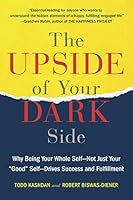
Against Happiness

The Antidote: Happiness for People Who Can't Stand Positive Thinking
Oliver Burkeman • 5 highlights
amazon.com



"Reality is subjective, and there's an unenlightened tendency in this culture to regard something as 'important' only if'tis sober and severe.
Sure and still you're right about your Cheerful Dumb, only they're not so much happy as lobotomized. But your Gloomy Smart are just as ridiculous.
When you're unhappy, you get to pay a lot of attention to
... See more